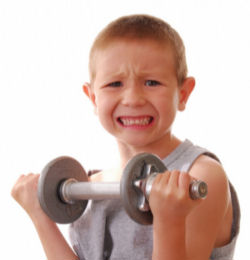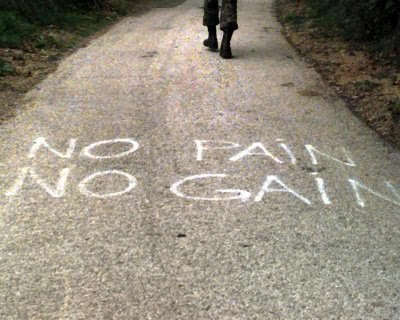This morning when I got out of bed, my first thought was ouchhhhh, what workout did I do yesterday?
(source)
The answer to that is NONE! I had taken yesterday off from exercising since I worked out every day last week, and knew I could use a rest day. The delayed onset muscle soreness (48 hours+ delayed) I’m experiencing is from my workout on Saturday, where I did some weight training exercises I haven’t done in awhile. Typically when I’m sore 2 days after a workout, I’ll first feel some aches the day after, but for some reason, that wasn’t the case this time.
I sort of have a love/hate relationship with muscle soreness. Obviously it’s not fun to have a hard time lifting my arms above my head (yes, that’s happening right now), but at the same time, it makes me feel like my workouts are challenging my muscles and making me stronger. I find myself sore pretty often because I’m constantly switching up my exercise routine.
The interesting thing about muscle soreness is that we don’t know a whole lot about it. There’s been an ongoing debate about both the cause and treatment of delayed onset muscle soreness. Though it was once believed to be caused by a buildup of lactic acid during an intense workout, we now know soreness occurs because of microscopic tears in muscle fibers and connective tissue, and is part of the adaptation process that leads to greater muscle strength and stamina.
Though I’m not an expert (and just admitted to feeling sore a lot!), there are some things I do often that I feel minimize the amount of muscle soreness I experience:
- Always warmup – I start my workouts with 5 minutes of cardio and some dynamic stretching (such as arm circles) to get my muscles warmed up before jumping into intense exercises.
- Eat post workout – I make sure to eat within an hour or exercising. I’ll have at least 15 g protein to help repair and rebuild my muscles, and also eat some carbs to boost my insulin levels (thus, helping my body to more efficiently utilize the amino acids from the protein I’m eating).
- Ice, ice, ice! I’m constantly icing muscles post-workout (especially my nagging calf injury) and really believe in the power of icing to help with the amount of soreness I feel.
- Stretching – It’s controversial if stretching actually helps with muscle soreness, but I do it after every workout. It can’t do any harm and feels great to stretch out after a hard workout.
- Rest, but don’t rest too much. The day after an intense workout, sometimes I’ll give myself a complete rest day. But then the day after that, I get back to it, even if I’m still sore. Other times I’ll do some low-impact aerobic exercise the following day, like a long walk with my dog, the elliptical, or my favorite sore muscle workout, yoga. Low intensity exercise increases blood flow and diminishes muscle soreness. So, even if you’re tempted to curl up in a ball in pain and not move for days, your body will feel better if you get moving.
- Treat yourself to some heat or a rubdown. Getting in a hot tub, sauna, or hot bath is also thought to increase blood flow to your muscles. Better yet, a massage does that too. Unfortunately, with my marine deployed, I don’t have anyone to nag to massage my achy muscles! I’m not able to get a massage every time I have muscle soreness (though I wish I did), but it certainly makes me feel better when I do.




Leave a Reply